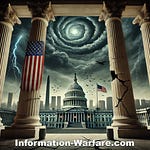By HASE Fiero | Information Warfare Magazine
At a time of global confusion and escalating tensions, clarity is not just welcome — it is critical. Drawing from decades of firsthand experience advising world leaders and watching geopolitics unfold, one seasoned economist and advisor delivers an uncompromising account of how American foreign policy—since the fall of the Soviet Union—has reshaped the world through coercion, regime change, and the pursuit of unchallenged hegemony.
The Making of a Unipolar World
When the Soviet Union dissolved in 1991, Washington did not see it as a chance for peaceful cooperation. It saw a power vacuum to fill. Rather than supporting Gorbachev’s reforms and stabilizing a fragile Russia, the U.S. chose to assert dominance. With ideologues like Cheney and Wolfowitz at the helm, the philosophy became clear: “We run the world now.”
From that moment, the U.S. ceased to recognize red lines or shared interests. Every war since — Serbia (1999), Iraq (2003), Libya (2011), Syria, and interventions in Africa — can be traced to this mindset. The pursuit of unipolarity wasn’t a policy; it was a doctrine.
NATO Expansion and Broken Promises
In 1991, U.S. and German officials assured Gorbachev that NATO would not move “one inch eastward.” Yet by 1994, the decision was made to expand NATO up to Russia’s doorstep. This wasn’t just mission creep — it was a full-blown strategic encirclement. Zbigniew Brzezinski’s Grand Chessboard laid out the blueprint: dominate Eurasia, prevent Russia’s resurgence, and weaponize alliances.
Ukraine and Georgia became keystone targets. Not because of their threats — but because they bordered Russia. Their purpose was geopolitical, not democratic.
Game Theory Replaces Diplomacy
The shift in American strategy went deeper than politics. Negotiation was replaced with simulation. Diplomacy with game theory. Based on calculations rather than communication, American policymakers no longer needed to ask what Russia or China thought. They just gamed out their presumed reactions — and always assumed they'd fold.
This detachment led to catastrophic miscalculations: pushing NATO eastward, installing missile systems in Poland and Romania, and ignoring all Russian objections until war was inevitable.
The Proxy War in Ukraine
In 2014, a U.S.-backed regime change operation in Ukraine ousted President Yanukovych, who had favored neutrality. Victoria Nuland’s leaked call with the U.S. ambassador confirmed U.S. orchestration. After the Maidan, Ukraine became a pawn in a long-planned geopolitical game.
When war broke out in 2022, Putin’s demand was not conquest — it was neutrality. Within 7 days of invasion, negotiations were underway. But Washington and London intervened, pressuring Ukraine to abandon talks. A million Ukrainians have died since.
Israel and the Middle East: A Hijacked Policy
Another bombshell in this narrative: the U.S. hasn’t run its own Middle East policy for decades. That role, the speaker argues, belongs to Israel — specifically Netanyahu. From the Iraq War to potential war with Iran, American policy has aligned seamlessly with the interests outlined in the 1996 Clean Break document, authored by Netanyahu’s team.
The aim? Undermine and fragment Israel’s adversaries — using U.S. military might.
Europe: From Ally to Vassal
Europe’s role in this saga is tragic. Once a pillar of diplomacy, it has become a subordinate. Its economic and political sovereignty have been undermined by an unwavering loyalty to U.S. interests, even as those interests devastate European economies and security. The destruction of Nord Stream, the baiting of Russia, and silent acquiescence to every American escalation show a continent without direction — or spine.
The Illusion of Leadership
The speaker offers a scathing assessment of U.S. political leadership. Biden is portrayed as a non-functional figurehead, managed by media theatrics. Trump is seen as a disruptive force — not a warmonger, but not a reformer either. His reluctance to carry the burden of failure may ironically lead to peace in Ukraine, not out of morality, but optics.
A World on the Brink — and the Call for Truth
The world stands at a crossroads. The American-led unipolar order has failed — not only in securing peace but in safeguarding truth. With the U.S. having unilaterally withdrawn from every major nuclear treaty and asserting the right to place missile systems anywhere, the risks have never been higher.
The takeaway is clear: Europe must reclaim sovereignty. Global diplomacy must be revived. And most importantly, people must see through the illusion — because silence is complicity, and the greatest danger lies not in questioning power, but in trusting it blindly.
Final Thought
“To be an enemy of the United States is dangerous,” Henry Kissinger once said. “But to be a friend is fatal.”
It is no longer enough to witness history.
It’s time to understand it.










